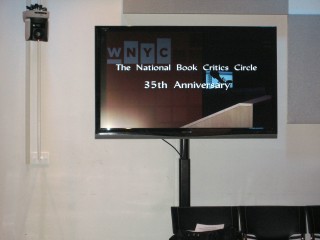Joel Conarroe, President Emeritus, John Simon Guggenheim Memorial Foundation, former president, PEN American Center, shares his memories of colleagues during his time on the NBCC board in the 1980s.
Brevity, that long-winded bore Polonius observed, is the soul of wit—and also, Dorothy Parker suggested, of lingerie. I’m not witty, but I will be brief.
When I joined the Board some thirty years ago, not yet a recovering academic, I was editor of a scholarly journal, the PMLA, whose articles were mostly written in polysyllabic jargon. You can imagine my pleasure in being part of a group of intelligent, astonishingly well-read fellow critics who wrote and spoke in lucid English—language cats and dogs could understand. I would gladly have paid to be part of such a symposium, which I came to regard as the Platonic ideal of an adult reading group.
I think of those years as a golden era, not just because we were discussing work by James Merrill and Joseph Brodsky, Seymour Hersh and Edward Hirsch, Stanley Elkin and Shirley Hazzard, among luminous others, but because those doing the talking were themselves so impressive. I suppose it is human nature to idealize one’s past and I sincerely hope that those of you now on the Board will be able to look back in thirty years and say, you know that was damn fine, that was truly golden.
Let me very briefly pay tribute to a few of my fair-minded, stimulating, sometimes outrageous, and always eloquent colleagues.
The late RICHARD POIRIER, a Johnsonian figure, was a powerful thinker, and when he talked, or rather growled, we all listened.
The late JOHN LEONARD, also brilliant, a true polymath, was often acerbic and always interestingly provocative.
The late WALTER CLEMONS was blessed with a kind of luminous common sense.
JEAN STROUSE, the dazzling biographer, was always thoroughly prepared and wonderfully articulate, as was CONNIE CASEY, then living in California.
Urbane RICHARD LOCKE quickly emerged as our leader, as had ELIOT FREMONT-SMITH, a mensch if there ever was one.
Sidney Smith once said, “I never read a book before reviewing it. It prejudices one so.” Sidney was not a member of our group.
GREIL MARCUS was often quotable, as were HERB LEIBOWITZ and God’s brilliant biographer, JACK MILES. CAROLYN SEE was an especially delightful presence, smart and funny.
MORRIS DICKSTEIN is one of the best read critics ever.
WENDY LESSER and I rarely agreed about anything, nor did the formidable MARGARET MANNING and I, but we respected each other’s opinions and became friends. It was the nature of the group to argue passionately but always, well, almost always, collegially. We rarely resembled intemporate crazies at a town hall meeting. I never, not even once, heard anyone shout, “You lie!”
There were moments of levity, and even of hilarity, especially when our brilliant Blanche DuBois was on hand. ELIZABETH HARDWICK was an eloquent advocate for writers she admired; as for others, well, not so much. Asked which of two novelists she thought more worthy she replied, “That’s like choosing between a flea and a louse.” Asked her opinion of a certain novel, she replied, “It would never occur to me to read that book.” I picture Lizzie in library heaven gently improving the taste of a host of angelic reviewers.
Finally I mention BRIGITTE WEEKS, then editor of the late lamented Book World. Brigitte read everything, and always had perceptive comments. She called me once, late at night and said she was absolutely enthralled by an immense biography and wanted to know whether she was crazy. So I read it. That was my introduction to one of the great writers of our era, Robert Caro, who, of course, won our prize. How could he not?! Our board colleagues were forever exchanging such priceless recommendations.
I salute my friends John Ashbery and Ed Doctorow, and I salute all my former colleagues for their passion and fair-mindedness. Finally, I tip my hat to those of you now on the board and thank you for giving me this chance to revisit some memorable times long gone by. As Eliot Fremont-Smith always said, Keep shining.


